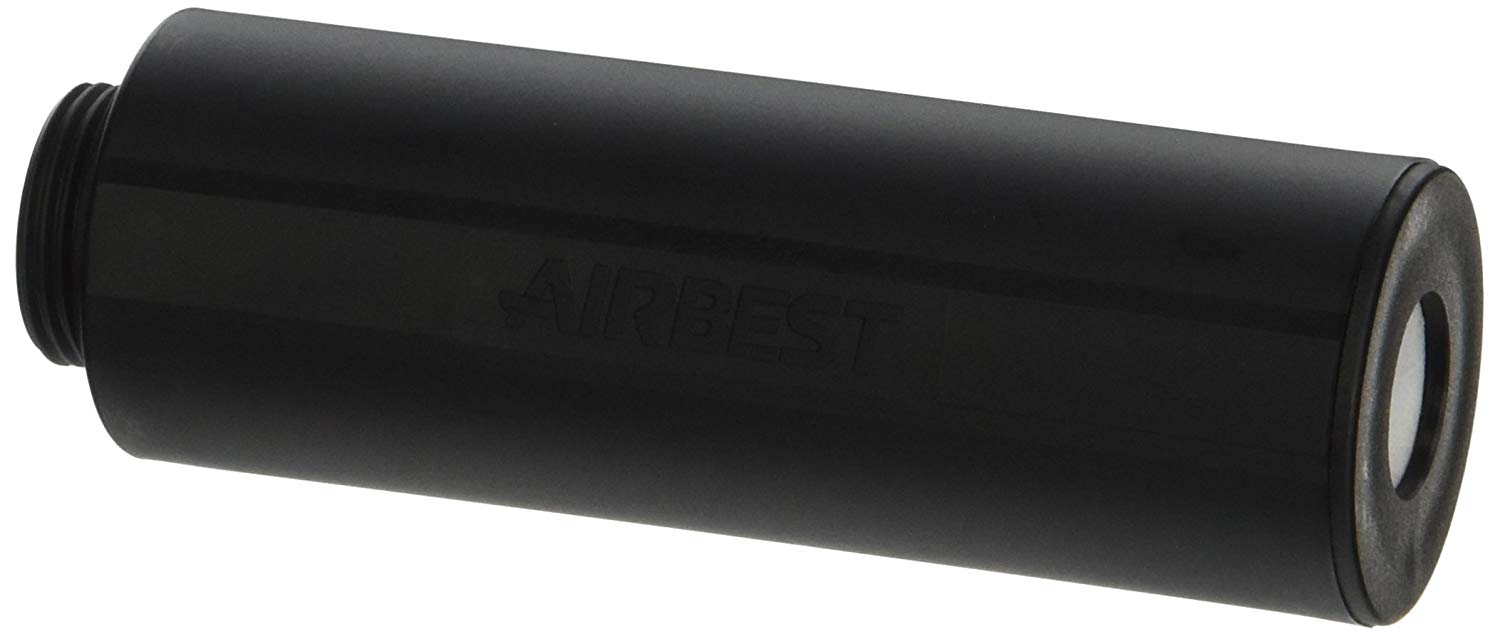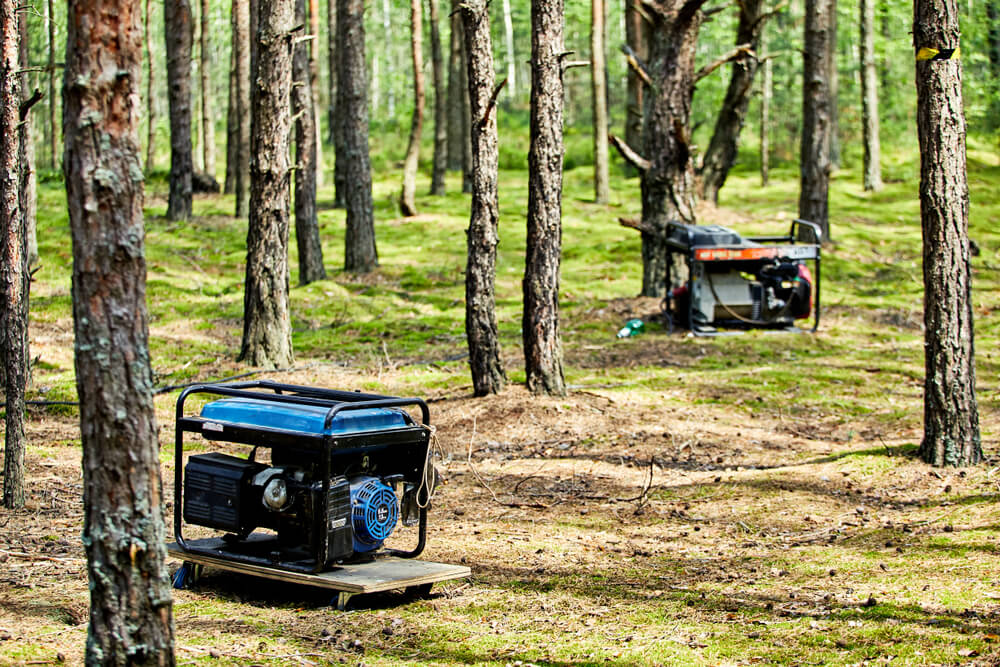Disclosure: This post may contain affiliate links. This means that at no cost to you, we may earn a small commission for qualifying purchases.
Last Updated on April 6, 2024
Having a generator around can get you out of a quick bind if the power goes out, or be your best friend while traveling around on a boat or RV where the nearest power outlet is miles away.
The only downside of a portable generator besides their fuel consumption is the fact that none of them are going to be sold with “whisper-quiet” printed on the box. That means your noisy generator makes can be a nuisance to yourself and the people around you.
A standard portable generator will give off anywhere from 60 dB at the quietest end and 100 dB at the loudest. Decibel scales are exponential as opposed to linear.
What this means is that an 80 dB generator is ten times as noisy as a 70 dB generator. So that means your generator will give off the sound equivalent to a normal conversation at best and as loud as being 2 feet away from the speakers at a nightclub at worst.
Contents
Why Should You Silence Your Generator?
From the perspective of yourself and your family, it should be noted that sounds at 85 dB and above will begin to cause permanent hearing damage to those exposed to it for long periods of time.
Simply put, the gift of electricity simply isn’t worth long-term hearing damage, especially to your family who didn’t necessarily sign up for that kind of tradeoff.
Even if you’re far away enough to not have to deal with the damaging effects of your generator, the constant sound of the generator running tends to be a nuisance to those around you.
The people in close proximity to you won’t appreciate the loud hum of a generator which might make you less likely to use it when you need it most.
So, silencing your generator is a consideration you’ve made for yourself and the people around you, not something that increases performance or anything else.
How To Quiet A Generator?
Now comes the real question, how do you actually accomplish the art of noise reduction given off by your generator?
The machine is going to make the same amount of noise as it always will when it’s operating properly, so it’s simply a matter of understanding what kind of strategies will dampen the sound that is available to you to reduce the noise and transform it into a quiet generator.
1). A Generator Silencer/Muffler :

Much in the same way that a car’s exhaust pipe can be muffled to more tolerable levels, so can a generator. These devices work by being installed at the end of the exhaust pipes on the generator and typically result in a reduction in overall noise by a total of around 10-15 dB once everything is said and done.
The exhaust pipes are relatively inexpensive and very easy to install on nearly every model of a portable generator and is perfect to make a generator quiet.
Look for a silencer specifically made for generators as opposed to just any commercial/industrial silencer you can find.
Some people choose to add car mufflers to their generators, but if you go this route, you’ll need to buy and assemble special parts to help hook everything up to each other.
It requires a bit of bending and welding know-how to be able to make a leak-free system that will actually allow the car muffler to function properly.
If you understand the concepts that go into a muffler you can even make your own at home; however, this should not be attempted by anyone but the most knowledgeable and professional DIY enthusiasts. An improperly made muffler can end up exploding.
Check out this popular muffler:
No products found.
No products found.
2). Add Padding Underneath Your Generator :

A big source of noise from most generators is the vibrations caused by the generator running that then transfer into the ground. Hard surfaces will cause these vibrations to be extremely noticeable.
So, an extremely simple and straightforward way to muffle some of the noise caused by your generator would be to apply a soft layer of padding underneath which acts as an anti-vibration mount. A rubber carpet pad or similarly soft material and place your generator far away.
3). The Plywood Board Method :

If those two methods are out of the question or you just want as many different muffling strategies as you possibly can, plywood boards can also effectively make your generator noise-free, from being broadcast far and wide. Hard surfaces usually limit noise transmission by reflecting sound waves.
Get some plywood boards that are slightly longer than your generator and lean them against the generator in a box shape as these are known as the best sound deflectors.
This deflects the sound downwards the ground and will result in the overall noise level is much more manageable. This method is favored for its convenience as the materials are easy to find and set up and take down is a breeze.
4). Create A Sound Wall
Similar to the plywood board method, building a sound wall is essentially another way of boxing in all of the noise created by your generator to make your generator much more manageable at the end of the day.
One of the simplest ways to create a sound wall is to stack cinder blocks around the generator and keep going until you are about one cinder block higher than the generator itself.
Don’t make the wall flush with the generator, a few inches of space is necessary to make sure you don’t mess with how it works at the end of the day.
The cinderblock method is nice because it’s a semi-permanent option that involves moving the cinder blocks from time to time whenever you need access to the generator.
A good generator can get you out of a lot of tricky situations. It can make traveling by RV much more convenient as you can use your generator sparingly when you need to shower or cook and have a much more comfortable time going into the deep wilderness.
Others enjoy a generator for more practical uses like working on a house or cottage and want to be able to use their power tools.
The only downfall to using portable generators is the noise factor. Luckily, for portable generators, these methods when used alone can all get you a benefit of a noise level reduction of 10-15 dB.
Remember, the decibel scale is exponential, so lowering it 10 dB means it is now ten times quieter and you can place the generator wherever you want.
5. Water Bucket Trick.
A loud generator can be a big turn-off, this method is used as customization for a much quieter running of the generator and is not a permanent adjustment. This method kind of channelizes the exhaust noise to a bucket of water, the logic being water is a sound insulator.
To make this work, connect a hose to the exhaust and have the other end drop into a bucket of water. Place a small hole where the hose reaches the top of the bucket to prevent any water from entering the exhaust pipes or place the generator at a higher level to produce less noise.
Note that this only will help reduce the noise around your generator from the exhaust pipes and does not reduce the noise caused by vibrations.
See Also :
Good advice. I’m sitting in my travel trailer now listening to a 2,000 watt unit brew my coffee. I’m headed to Home Depot later today for some plywood & cinder block 👍
Thanks!
Where can we buy generator mufflers ?
Hi Francois, are you looking for a replacement like this one or a silencing kit? If the latter, here’s a kit for an RV generator that works really well.
80db is twice as loud, not 10 times as loud, as 70db.
https://www.chem.purdue.edu/chemsafety/Training/PPETrain/dblevels.htm
Thanks for your feedback, Tim. It’s a contested area of discussion. Here’s what the CDC and government have to say about it (10x as loud): https://www.cdc.gov/nceh/hearing_loss/what_noises_cause_hearing_loss.html Here’s what the science industry has to say about it (10x as loud): https://pulsarinstruments.com/en/post/understanding-decibels-decibel-scale-and-noise-measurement-units Your reference is akin to the folks I found at a technology and digital music website that say it’s a doubling and not a 10x increase, but note it’s a psychosocial measurement they’ve done here from volunteers and their perception. I can’t find that link right now.